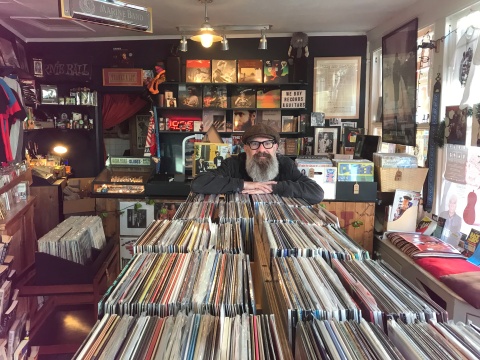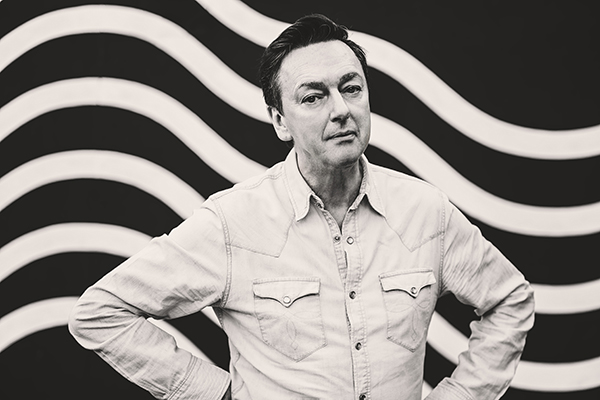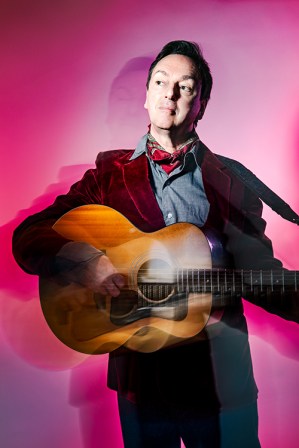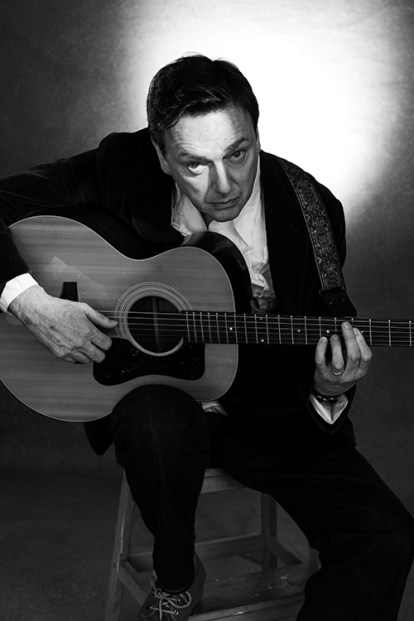In an exclusive interview, Stephen Duffy, singer-songwriter and frontman of The Lilac Time, tells Say It With Garage Flowers why his band’s new album, Dance Till All The Stars Come Down, is the best thing he’s ever done, how he wrote the record thinking these could be the last songs he’d ever write, and why he thinks what he does is out of fashion.
“I’ve had a bizarre gardening accident,” says singer-songwriter, Stephen Duffy, frontman of indie-folkers The Lilac Time – he is talking to Say It With Garage Flowers over Zoom from his home in Falmouth, Cornwall, and sporting a cut lip.
“I put it down to global warming – a little tree had blown over,” he explains. “I got a stake and I pushed it into the ground to hold the tree back, but the stake broke and I fell into the wall. The climate pledges have got to be met because I’m having a lot of trouble out here in the garden.”
Big issues, such as climate change and wildfires (Adiós And Goodnight), the plight of Syrian refugees and the rise of Trump, (A Makeshift Raft) and the cruelness of the Tory government (The Long Way) are all subjects that Duffy explores on The Lilac Time’s latest album, Dance Till All The Stars Come Down.
Their first album since 2019’s Return To Us and the eleventh since they released their eponymous debut in 1987, it’s a wonderful record. Acoustic, stripped-back, sparse and intimate – it doesn’t feature conventional drums or bass – it has a rustic country-folk feel. It’s also very much a family affair – The Lilac Time comprises Duffy, his brother, Nick, and wife, Claire.
‘The climate pledges have got to be met because I’m having a lot of trouble out here in the garden’
Ben Peeler plays pedal steel guitar and the songs have been beautifully mixed and mastered by the Grammy-winning John Paterno, who has worked with The Lilac Time since 2015 – his other clients include Bonnie Raitt, Badly Drawn Boy and Robbie Williams – Duffy co-wrote songs with Williams in the early Noughties.
Q&A
I love the new record – I’ve been playing it loads…
Stephen Duffy: Thank you.
You think it’s the best album you’ve ever made, don’t you?
SD: I think so. I suppose you always think that, and then years later, you think, ‘that was a load of old nonsense’. But, with this, getting rid of the bass and drums and focusing on the guitar playing and the singing has made it feel better for me – it forced me to concentrate more on the songs too, because there was nothing to hide behind. There’s also mandolin and a bit of pedal steel on it.
Why did you decide to make a stripped-down record?
SD: I play the bass and drums, but I was thinking that perhaps I do that because I enjoy it and I wasn’t always serving the song – I was serving my wish to have fun, which is great for me, but it might not be useful to the music and to the song. So, I thought, ‘I’m not going to do that’.
One of the reasons was because I thought it would be quicker, but it was much slower because every little guitar and vocal thing was completely exposed.
I recorded it just after the pandemic, so my chops – or my chop, as Leonard Cohen would probably call it – weren’t well-oiled. I had to play some of the songs as if I was going on tour, just to get them sounding fluid. There were a couple of first takes but a lot of it took a lot of work.
Wasn’t the first single, A Makeshift Raft, written in 2015?
SD: It started then.
And it was inspired by the death of Syrian refugee, Alan Kurdi, who drowned while attempting to reach Greece…
SD: When you write about something as awful as that – a Syrian boy dying – you think, ‘Where do I go from there?’ ‘What else is there?’
So, I stopped at that point, but then there was the Trump thing and Brexit, so I started to write more and more verses, and then, just before I recorded it, I wrote the happy verse at the end, to send everybody home laughing: ‘I’ll see you on my handlebars, sing me songs of love,’ which kind of refers back to Return To Yesterday [from the band’s self-titled 1987 debut album].
‘When you write about something as awful as a Syrian boy dying, you think, ‘Where do I go from there?’ ‘What else is there?’
The second single, The Long Way, is also a political song – it’s a rebuke to Tory voters, isn’t it? It seems to be about the unkindness of a lot of the current government’s policies and its cruel attitude towards a lot of people…
SD: What gets me is the way that they talk about ‘the blob’ – the machinery of this country, like the laws and the civil service, which make things go, but ‘the blob’ is them and the readership of The Daily Express and The Daily Mail.
How do they think they’re going to get people [on their side] by coming up with horrible policies? It can’t appeal to young people – the people it appeals to must be either senile or dead. It’s very short-term and it creates so much divide and hatred when we’ve got to get together and sort out the real problems, like child poverty, complete poverty – people going to food banks – and climate change. That’s been normalised.
It never really occurred to me that The Long Way was a song about politics – it’s more of a song about finding people and finding your tribe. For some people, that’s your family, or finding a group.
Music is less tribal these days, isn’t it? There used to be definite groups of people who liked different types of music – mods and rockers, indie kids and clubbers, disco versus rock ‘n’roll…
SD: We only had music, didn’t we? I saw an old guy I used to work with and I said, ‘What has taken over from music?’ It was so central to our lives – someone had an album and you went round to theirs to listen to it… He said, ‘The phone.’ And I said, ‘What about the phone?’ And he said, ‘It doesn’t matter, so long as it’s coming out of the phone or on it.’ That’s the whole thing…
It’s very depressing when you look at your statistics for your endeavours on social media or the streaming stats, which are ludicrous – you have to open the spreadsheets up so much that they get to .0000. Where do I get my 1? You get so little from the plays… Most people only listen for 20 or 25 seconds.
I did an unboxing video [on Instagram] or the new album – it was like 1 minute and 10 seconds – and people only watched the first 25 seconds. Haven’t they even got a minute to wait for me to take the thing out of the box?
You’ve said that you wrote the songs for the new record as if they were going to be the last songs ever written – by you or anybody. Was that inspired by something Bob Dylan once said around the time of the Cuban Missile Crisis?
SD: Yes – I think he said that because the bomb was going to drop, he had to get everything out and put it in one song [A Hard Rain’s A-Gonna Fall ] – and it’s such a stunning song.
I wanted to feel that I’d got everything into each song that I wanted to get in and, if was going to be your last song, make it a good one.
So, did you feel like it was the end of the world while you were writing the album?
SD: With the climate tipping point we’re now at, it did feel like that. You’ve got kids, haven’t you?
Yes – I’ve got four-year-old twin boys…
SD: My girl is 11. Even though it might be the end of the world, you want to be positive and to fight for it not to be – you can’t allow yourself to go into some kind of depressing 12-song dirge.
 In the song Adiós And Goodnight, you mention seeing wildfires in California. You lived in L.A. when you were writing with Robbie Williams, didn’t you?
In the song Adiós And Goodnight, you mention seeing wildfires in California. You lived in L.A. when you were writing with Robbie Williams, didn’t you?
SD: Yes – you could see the fires and smoke from Mulholland. It looked like the end of the world, when you saw the pictures of the burnt-out houses.
Let’s not make people think this is the most depressing album in the world, but you can’t turn your back on things and pretend they’re not happening.
Considering the state of the world, why do you think many younger contemporary artists and pop acts shy away from writing protest songs?
SD: The period when people think pop was squeaky clean – just after punk, when pop had a revival and there was the second British Invasion… when you think of Bronski Beat and Red Wedge… There were so many people who stood up for something but just happened to make pop songs or didn’t divorce their private life from their music.
Now, there’s so much stuff being put up on Spotify everyday… If a record company wants to put its money behind something, they’re not going to choose anything contentious, are they? They go for the safest thing over and over again.
The first song on the album, Your Vermillion Cliffs, is a dramatic ‘50s-tinged strummer. Was the sound of it inspired by The Everly Brothers?
SD: The Everlys always had very manicured drums, like on Ferris Wheel and Till I Kissed Her, so that was part of it, but the strumming is kind of Dylanesque and there’s a French ballad thing going on. It’s a throwback in many ways – I know that I’m working in a completely outmoded form. People do not write songs like this anymore, do they? It’s a genre that is not being practised.
Do you write your songs on acoustic guitar?
SD: Yes – if you’re going to do that, you can’t fuck around. You’ve got to nail each one.
I love the opening line from Your Vermillion Cliffs: “I’ve never liked my birthdays, they always make me sad.” Morrissey would be proud to have written that…
SD: It’s also kind of true, but this year was okay…
Are you 63?
SD: Yes – 63. A couple of months before my birthday, I used to feel a little down and I’d think, ‘What’s going on?’ Then I’d realise ‘Here we go again…’
I’m 50 next year, but I’m feeling alright about it at the moment….
SD: Your fifties go so quick – that’s the problem. You get to 50 and you think, ‘Hey, it’s not so bad,’ and then it’s like, ‘Hang on – I’m 60! How did that happen?’ Nothing beats 30 – that for me was the worst one. I had failed to become as big as The Beatles…
‘As a kid, I had this thing in my head that I was going to be as great as Crosby, Stills, Nash & Young. Suddenly I realised that I wasn’t even going to be as good as a Graham Nash B-side!’
When you were young, and in the early line-up of Duran Duran, before they became famous, did you want to be a pop star?
SB: Not really – I didn’t have the ambition to do that. Otherwise, I would’ve stayed with them. I had that crazy Marc Bolan angle on it – I wanted to be a poet and a rock ‘n’ roll star. I’ve always made things as hard as possible…
When I was 29, we were making Paradise Circus [The Lilac Time’s second album – from 1989] and I’d given up smoking. Something happened to my voice and it went really reedy. The engineer said, ‘Why don’t you start smoking again? – he was imploring me.
As a kid, you have this thing in your head that you’re going to be as great as Crosby, Stills, Nash & Young and then, suddenly – and it was late for me – I realised that I wasn’t even going to be as good as a Graham Nash B-side! I’d really have to struggle… So, 29/30 was when I had the first glimmer of reality, which was ‘be yourself.’ You can’t be anything another than that.
My favourite song on the new album is The Band That Nobody Knew, which is about being on the road and the dysfunctional relationship you have with touring…
SD: It’s that thing about being in the van and, however shambolic the last gig was, you’ve got another one tomorrow, and that bit in-between towns, where you can put that behind you and focus on being godlike tonight. You’re in your little cocoon. That’s the crazy thing about pop – when you’re successful, or even not, you can get into a little bubble, even if you’re a little band driving around in a van.
When you started writing songs with Robbie Williams, you had a glimpse of pop stardom through his eyes. How was that – seeing the bubble that he was in?
SD: The ultimate bubble…
If you’d become famous, could you have coped with it?
SD: It made me realise that I’d done the right thing leaving Duran. I would never have wanted to have that on my shoulders. Also, just that repetition of songs you don’t want to play.
With The Lilac Time, we tried to play the first album at Port Eliot Festival in 2017 or 2019 or something, and we started rehearsing it. Halfway through, I just couldn’t do it. I didn’t want to be 25 again and I couldn’t get behind the songs – not even in a nostalgic ‘this is fun’ way.
I think Rob had trouble with that too – he’d done so many tours and he’d played those songs so often. There’s nothing like not playing a song for a stadium that wants you to play it. I was more like I didn’t want to play Love Becomes A Savage to 300 people at Port Eliot Festival – it was a different kind of pressure on me.
Blur are back – you worked with Alex James in Me Me Me in 1996…
SD: We’ve got to save the Me Me Me revival. We could probably play Falmouth Town football club, but I don’t think we could fill it…
On The Last Day of the Last Days of Summer, from the new record, is a beautiful song, and you’ve used a line from it for the album title, Dance Till All The Stars Come Down, which was also inspired by a W.H. Auden poem…
SD: The album was going to be called On The Last Day of the Last Days of Summer but when Claire and I were singing that song and we sang the line, ‘Dance ’til all the stars come down,’ I thought, ‘That’s what it is.’ It contained an emotional punch.
The Lennonesque acoustic guitar picking on it sounds like Julia from The White Album…
SD: Yes, and, of course, Donovan takes some of the responsibility for that – for teaching The Beatles that in Rishikesh. He probably takes responsibility for a lot of things, though.
Candy Cigarette has a folk-blues feel, with mandolin. What inspired that song?
SD: Musically, it was kind of inspired by Candy Man and the early folk picking songs that I loved when I first got into Dylan. I think he actually did Candy Man on a bootleg.
When I was picking away and I came up with the lick, I thought it was like Candy Man and then I spent ages trying to desperately make it work – ‘I got no silver spoon. I got a candy cigarette…. I got close, but no cigar – I got a candy cigarette.’
Was the new record fun to make?
SD: Apart from the fact that I was exposing every deficiency in my singing, guitar playing and lyric writing… It was kind of torturous, but the end result was so good – thanks to Ben Peeler for playing pedal steel, which really added something.
I love making records – I think this is my twenty fourth or something. I’m working on a 20-CD box set – it will be out in October 2024.
Instead of just repackaging all the albums, I’m making 20 completely new compilations involving mixes – and some songs – that have never been heard.
It’s taken such a long time – just making a nine-track album can take you months. I’m now making 20 albums – there are two CDs of live stuff that’s never come out and two CDs of unreleased stuff and demos and stuff like Cocksure, which I did with Step hen Street in 1985. That became Because We Love You, but it was before the record company tore it apart and stuck it back together.
hen Street in 1985. That became Because We Love You, but it was before the record company tore it apart and stuck it back together.
It will also have Music In Colours in it, which I did with Nigel Kennedy – it had transition pieces on it, but we’re going to do an album without those, and then we’re going to do an album of just instrumentals and the transitions.
There’s something for everyone from each period – I’ve got a demo of Kiss Me, when I’m playing it for the first time on piano and it sounds like Blueberry Hill. If I’d have stuck with that, it would never have been a 20-CD box set…
‘People don’t want songs. George Jones is dead and who would I write with? Who would my antique style of songwriting appeal to? Richard Hawley writes his own’
You’ve been writing songs since 1978…
SD: Yes – the first song I wrote that I thought was any good was Aztec Moon, which we released on The Devils and The Hawks albums.
Would you like to do more songwriting collaborations?
SD: People don’t want songs. George Jones is dead and who would I write with? Who would my antique style of songwriting appeal to? Richard Hawley writes his own. I know that what I’m doing is a niche.
Any plans to write an autobiography? I think you mentioned it the last time we spoke…
SD: It’s just a Lilac Time thing – that’s still going on. It might be ready at the same time as the box set – if I don’t fall over gardening.
Dance Till All The Stars Come Down is released on July 21 (Poetica). It’s available on vinyl, CD and digital.





